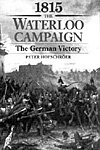
The German Victory: From Waterloo to the Fall of Napoleon
Author: Peter Hofschroer
Pages: 384
Illustrations: 21 black & white reproductions of period paintings and engravings of personalities
and places.
Maps: 25, from strategic situation maps to grand tactical showing brigades, divisions and corps, to
very detailed tactical maps such as the Attack of the French Guard at Waterloo showing precise locations and movements of 11 Guard battalions at the end of the battle.
Footnotes: 528
Appendices: Three, including Losses of Allied Forces, Who Marched Furthest and Fought Hardest, and The Race to Paris, plus orders of battle, glossary of siege warfare terms, and comparative tables of rank.
Bibliography: 8 manuscript sources, 19 periodicals, 118 books.
Index: More than 650 entries
Publisher: Greenhill Books, London
Publication Date: 1999
Binding: Cloth (hardbound)
ISBN: 1-85367-368-4
Price: $49.95
Summary: With the publication of 1815: The Waterloo Campaign -- The German Victory, Peter Hofschroer completes his two-volume study of the climactic contest between Emperor Napoleon and the Duke of Wellington and Field Marshal Blucher. Hofschroer's work is a scholarly presentation in a clear writing style, covering the movements and battles of the French, Anglo-Allied and Prussian armies from 17 June 1815 to the fall of Paris in July of that year. Hofschroer makes a convincing argument that German forces deserve the lion's share of the credit for the Allied victory in what was to be the last act of the Napoleonic Wars.
Although there are numerous accounts of the battle of Waterloo, Peter Hofschroer is able to present new material, especially about the Prussian army and German units serving under Wellington. Equally impressive is the information about what happened after the rout of the French on the 18th. While many books on the campaign stop when the battle ends, Hofschroer explains the Allied pursuit to Paris and the more mundane but equally dangerous siege operations undertaken to reduce enemy bastions which threatened the Allied line of communications as they drove further into France. It was the aggressive pursuit by the Prussians after the battle of Waterloo which Hofschroer believes was a major factor in Napoleon's decision to abdicate for the second and final time.
Peter Hofschroer is an internationally known Napoleonic historian who lives in Austria. He has written numerous articles and books dealing with the Prussian army of the time. In 1998 his critically acclaimed 1815: The Waterloo Campaign -- Wellington, His German Allies and the Battles of Ligny and Quatre Bras caused a firestorm of controversy as it accused the Duke of Wellington of deliberately deceiving his Prussian allies which resulted in their defeat at Ligny (this story was reviewed in Napoleon #14). This book explores the Duke's duplicity further by attempting to show the cover-up of his mistakes for years after the campaign.
The author writes in the preface that the central themes in this work, as in his first volume, is to demonstrate that the Prussian/German forces in the campaign of 1815 were the crucial element in the Allied victory, and secondly that the Duke of Wellington played false with his German allies throughout the campaign, giving them little support and then denying the full worth of their contribution afterwards.
For the most part Hofschroer proves his contention that the Germans did more to secure victory over France in 1815 than they have been given credit for in English language histories over the last 185 years. However, as in part one of this two-part series, Hofschroer's pro-Prussian bias detracts from his otherwise cogent arguments. To this reviewer the controversy about Wellington deceiving the Prussians seems a bit contrived, although it is probably not simply a ploy to sell books. It certainly has outraged a number of British historians. Rather than focus on Hofschroer's debatable thesis about Wellington, it is more important to praise Hofschroer for providing Napoleonic historians and enthusiasts with a very good, detailed account of the Prussian army in the Waterloo campaign, replete with stirring battle scenes on the regimental, battalion and battery level, and all the more gripping with first-hand accounts.
Peter Hofschroer has made an important contribution by writing about the epic events of 1815 from an essentially German point of view, thereby filling a major gap in the English language literature on the subject. Detailed, controversial and highlighting the part played by the Prussians and Germans in the campaign, 1815: The Waterloo Campaign -- The German Victory, is a comprehensive and recommended Napoleonic military study.
Excerpts from 1815: The Waterloo Campaign
Napoleonic Library: Reviews of selected books
-
Book Review: Secret Service: British Agents in France 1792-1815
Book Review: 1815: The Waterloo Campaign
Book Review: In the Service of the Tsar Against Napoleon
Book Review: In the Legions of Napoleon
Book Review: Followup: Greenhill Napoleonic Wars Data Book
Book News: Various Publishing Efforts
Back to Table of Contents -- Napoleon #16
Back to Napoleon List of Issues
Back to MagWeb Master Magazine List
© Copyright 2001 by Napoleon LLC.
This article appears in MagWeb (Magazine Web) on the Internet World Wide Web.
The full text and graphics from other military history magazines and gaming magazines are available at http://www.magweb.com
Order Napoleon magazine direct